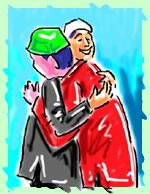
The holy month of Ramzan is very auspicious to the Muslims worldwide. Ramzan-Id, also known as Eid-ul-Fitr is celebrated all over India. 'Eid' means celebration and 'Fitra' stands for donating a dutiable part of total family income to the poor and needy. It is celebrated the next day after the crescent (Idd ka chand) for the 10th lunar month of the Islamic calendar is sighted. The Muslims are ordained to observe fast for 30 days (sometimes 29 days, owing to the early sighting of the crescent) starting with the sighting of the new moon and end it after seeing the new moon the next month.
Eid-Ul-Fitr is the holiday that follows the blessed month of Ramadan and falls on the 1st day of Shawwal, the 10th month in the Hijra calendar. As with all months in the Hijra calendar, it begins with the sighting of the new moon.
It is a very happy festival, especially for children who get gifts and money called 'Eidy' after having joined the elders at mass prayers and paying their respects to them. The bazaars are decked out and people go to Eid prayers in new clothes and accessories creating an atmosphere of colourful joy, happiness, and brotherhood.
Eid-ul-Fitr brings a message of peace, friendship and brotherhood which is displayed by 'Eid-Milan', literally meaning, 'embracing and celebrating together'. This is done after Eid prayers when all embrace each other at the mosque. Friends and business acquaintances of all faiths and communities are invited home for Eid-Milan and are served festive food including Sewaiyaan (vermicelli/noodles cooked in ghee (clarified butter) and milk with sugar), also known as Payasam in South India. Special literary and cultural programmes are organised and broadcast on radio and television, to spread the message of oneness of communities, and love and friendship throughout the world.
Every Muslim is required to offer the Id prayer with his brethren in faith. Fitr means alms, and before joining the prayer, every Muslim gives alms for the month of Ramadan to the poor. This is different from the normal zakat, which is given to purify one's wealth. This zakat is normally given to local Muslim needy. It can be given anytime during the month of Ramadan and is often given early, so the recipient can utilise it for Eid purchases.
After the alms have been distributed, the gathering goes to the house of the Muslim religious official for Id prayers. Prayers are held at grand mosques in all major cities of India like the largest Jama Masjid in Delhi, Mecca Masjid in Hyderabad where the scene is that of a fair: festivities, games and shops or stalls for children and adults. Mosques are crowded, and recitations from the holy Koran can be heard from a distance over loudspeakers fitted in mosques and other religious gatherings.
At the end of the prayer, the Kazi delivers a sermon, then offers special prayers to Allah for the welfare of the faith, remission of sins of all Muslims, for the safety of pilgrims and travellers, for the recovery of the sick, for timely rain, for protection from misfortune and for freedom from debts. Thereafter, people visit friends and relatives to say Id Mubarak and to attend Id fairs to buy toys and trinkets. Id-ul-Fitr is a festival for a general expression of goodwill.
It is believed that the holy Quran, came into existence during this month. Prophet Mohammad who compiled this was an illiterate person. However, he was chosen by the God to be his messenger. Whenever any problem arose, he would get "Vahi" (inspiration from God). He would become red and would speak out spontaneously. All these utterings were jotted down by his disciples and during this month they were compiled in the form of the holy Quran. It is a message from God to the mankind.
During the Ramzan month, the fast begins daily from the time the first streak of light is seen at dawn till nightfall when the stars are seen in the sky. One can take lawful food at night, but during the day even drinking water is prohibited. In India, the daily fasts are observed strictly and with enthusiasm.
The fast is mandatory for all adult Muslim men and women, except the insane, infirm, sick or travelling and pregnant or feeding mothers. They can complete the prescribed number of fasting days by choosing to fast on some other days. Those who cannot fast, except with great hardship, should arrange to feed at least one needy person in lieu of the days one missed out on fasting.
Apart from bringing the Muslims face to face with the hard realities of life like the pangs of hunger, thirst, and deprivation, Ramzan is an annual training period inculcating discipline and declaration of subservience to the laws of God, enumerated in the holy Quran.
The last 10 days of Ramzan are more important as the faithful watch for Lailathul Qadr (the night of power) during which the revelation of the book to the Prophet was completed. In a way, it is considered the climax of Ramzan and Muslims keep awake all night praying or listening to sermons by Ulema or the high priest.



0 comments:
Post a Comment